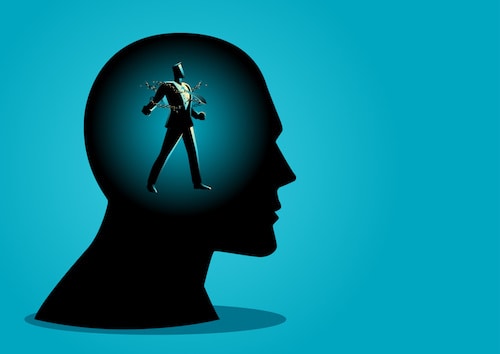Stigma is a shield created by society, made up of misunderstanding and fear of mental illness. When we look away from someone behaving erratically or “strangely” on the street, that’s the fear society ingrains in us. Perhaps we’re scared to consider the possibility that the same could happen to us; that we might be shunned by society, too.
The shield of stigma also stops us from seeking help for our own mental health. When faced with a stressful life event or emotional challenges, we might carry the hurt or confusion inside. Perhaps we avoid facing a potential diagnosis, so our illness only grows worse. Stigma facilitates mental illness turning into the “monster” it doesn’t have to be.
Social perceptions need to change. However, stigma is so deeply rooted in societal norms that it can take a long time to eradicate. And people like me, people living with mental illness, can’t wait on society to change. We need to live now. In fact, we need to be pioneers.
Our Experience Combats Stigma
First, we need to overcome our own belief in society’s fears. This requires finding hope, and specifically recognizing the possibility of recovery. Recovery from mental illness is living a full and productive life with mental illness. With this mindset, we can take ownership of our condition and live a fulfilling life. This can be one of the most powerful forces for change.
Stories of living fully with mental illness can help reshape society’s bias. They also provide inspiration and guidance for other people living with mental illness. This is the power of peer support and sharing lived experience. It creates a cycle of more people finding recovery, and then in turn, society seeing more positive examples of people living well with mental illness. Society needs to see what life with mental illness can and should be—a life of possibility, not a life sentence.
Our Experience Inspires Others
When people share their mental health journeys, it also helps set our own expectations. Recovery is hard and there is no smooth path to get there. It’s also not a cure, it requires continuous patience, discipline and determination. There will be stumbles and uncertainties along the way. This is the reality of mental illness. That’s why relatable, real-life examples are so valuable.
Knowing that others are going through similar challenges can help us build resilience. The result is self-empowerment by the example of others. We, the mental health community, rely less on the image society projects upon us, and instead focus on the image reflected to us by our peers. This is the power from within ourselves and our community.
I believe that this type of person-driven recovery has been overlooked as a way to combat social stigma. It’s become so ingrained that not even people with mental illness think recovery is possible. Too many of us allow society’s fears to become our own. Together, we can reverse the vicious cycle of stigma and instead, power the virtuous cycle of hope and recovery.
Katherine Ponte is a Mental Health Advocate and Entrepreneur. She is the founder of ForLikeMinds, the first online peer-based support community dedicated to people living with or supporting someone with mental illness and is in recovery from Bipolar I Disorder. She is on the NAMI New York City Board of Directors.
https://www.nami.org/Blogs/NAMI-Blog/October-2018/The-Power-to-Create-Change-Comes-from-Within
